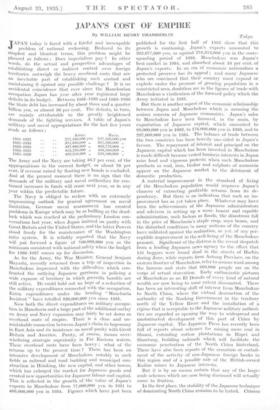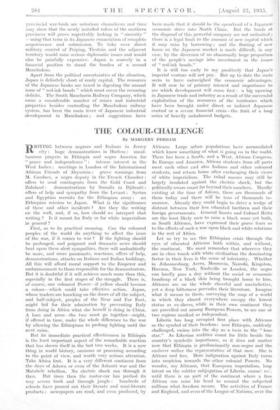JAPAN'S COST OF EMPIRE
By TAPAN today is faced with a fateful and inescapable 0 problem of national reckoning. Reduced to its simplest and bluntest terms, this problem might be Phrased as follows : Does imperialism pay ? In other Words, do the actual and prospective advantages of establishing direct or indirect control over foreign territories outweigh the heavy overhead costs that are an inevitable part of establishing such control and Maintaining it against any possible challenge ? It is, no accidental coincidence that ever since the Manchurian occupation Japan has year after year registered large deficits in its budget. Between 1931-1932 and 1935-1936 the State debt has increased by about three and a quarter billion yen, or almost 50 per cent. The deficits, in turn,. are mainly attributable to the greatly heightened demands of the fighting services. A table of Japan's military and naval appropriations for the last five years reads as follows : 1931-1932 Army. 227,480,000 YOU wavy, 227,120,000 yen 1932-1933 311,630,000 ,, 307,590,000 „ 1933-1934 447,680,000 ,, 403,770,000 „ 1934-1935 .. 453,220,000 ,, 488,500,000 „ 1935-1936 .. 492,950,000 I 529,580,000 „ The Army and the Navy are taking 46.7 per cent. of the appropriations in the current budget, or about 70 per Vent. if revenue raised by floating new bonds is excluded. And at the present moment there is no sign that the demands of the military and naval authorities for con- tinued increases in funds will cease next year, or in any Year within the predictable future. The Navy is obliged to reckon with an extremely unpromising outlook for general agreement on naval limitation. German naval rearmament has created problems in Europe which may be as baffling as the dead- lock which was reached at the preliminary London con- versations last year, when Japan insisted on parity with Great Britain and the United States, and the latter Powers stood firmly for the maintenance of the Washington ratio system. It is reliably reported that the Navy Will put forward a figure of 700,000,000 yen as the minimum consistent with national safety when the budget for 1936-1937 comes up for discussion. As for the Army, the WarMinister, General Senjuro Ilayashi, recently returned from a trip of inspection in Manchukuo impressed with the difficulties which con- fronted the outlying Japanese garrisons in policing a Wide expanse of territory in which guerrilla bandits are still active. He could hold out no hope of a reduction of the military expenditures connected with the occupation. Extra expenditures under the heading " Manchuria Incident " have totalled 820,000,000 yen since 1931.
Now both the direct expenditures on military, occupa- tion in Manchuria and a large part of the additional outlay on Army and Navy expansion may fairly be set down as overhead costs of empire. There is a close and un- mistakable connexion between Japan's claim to hegemony in East Asia and its insistence on naval parity with Great Britain and America. Parity, of course, means over- whelming strategic superiority in Far Eastern waters. These overhead costs have been heavy ; what of the returns up to the present time ? There has been an intensive development of Manchukuo, notably in such fields as railroad and road building and municipal con- struction in Hsinking, the new capital, and other towns, which has enlarged the market for Japanese goods and created new opportunities for Japanese labour and capital. This is reflected in the growth of the value of Japan's exports to Manchukuo from 77,000,000 yen in 1931 to 408,000,000 yen in 1934. Figures which have just been published for the first half of 1935 show that this growth is continuing. Japan's exports amounted to 205,677,000 yen, as against 176,813,000 yen in the eorre- sponding period of 1934. Manchukuo was Japan's best market in 1984, and absorbed about 18 per cent. of Japan's exports. In an era of economic nationalism a protected preserve has its appeal ; and many Japanese who are convinced that their country must expand or, explode under the pressure of growing population in a constricted area, doubtless see in the figures of trade with Manchukuo a vindication of the forward policy which the Army initiated in 1931. • But there is another aspect of the economic relationship between Japan and Manchukuo which is arousing the serious ,concern of Japanese economists. Japan's sales to Manchukuo have been financed, in the main, by exportation of Japanese capital, which amounted to 90,000,000 yen in 1982, to 176,000,000 yen in 1983, and to 237,000,000 yen in 1934. The balance of trade between the two countries has been heavily one-sided in Japan's favour. The repayment of interest and principal on the Japanese capital which has been invested in Manchukuo is made difficult because vested business interests in Japan raise loud and vigorous protests when such Manchukuo products as coal, iron, timber and sulphate of ammonia appear on the Japanese market to the detriment of domestic production. • A material improvement in the standard of living of the Manchukuo population would improve Japan's citable returns from its de- pendency. of extracting pro pendency. But there is no indication that such an im- provement has as yet taken place. Whatever may have been the achievements of the Japanese administrators and advisers in setting up a more honest and capable administration, such factors as floods, the disastrous fall in the price of Manchuria's staplesecre sections of the u oop,sooyabeacnos, country the disturbed conditions in many ti have militated against the realization, as yet, of any per- ceptible improvement in the well-being of the Manchukuo peasant. Significant of the distress is the recent despatch from a leading Japanese news agency to the effect that 151 beggars were found dead in the streets of Harbin during June, while reports from Antung Province, on the eastern frail tier of Manchukuo, refer to serious want among the farmers and state that 600,000 people are on the verge of actual starvation. Early enthusiastic pictures of Manchukuo as an El Dorado of every kind of natural wealth are now being to some extent discounted. There has been an interesting shift of interest from Manchukuo to North China, where the virtual destruction of the authority of the Nanking Govnedrnntihee installation north of the Yellow River a regime that is acceptable to the Japanese military authori- ties are regarded as opening the way to widespread and unobstructed development of this part of China by Japanese capital. The Japanese Press has recently been full of reports about schemes for mining more coal. in Shansi, extending • cotton plantations in Hopei and Shantung, building railroads which will facilitate the economic penetration of the North China hinterland. There have also been reports of the cessation or curtail- ment of the activity of non-Japanese foreign banks in this region and of a possible sale of the British-owned Kailan mines to Japanese interests, But it is by no means certain that any of the .large- scale schemes which are now being discussed will actually come to fruition.
In the first place, the stability of the Japanese technique of dominating North China remains to be tested. Chinese provincial war-lords are notorious chameleons and time may show that the newly installed rulers of the northern provinces will prove regrettably lacking, in " sincerity " —using that term in its Japanese connotation of complete acquiescence and submission. To take over direct military control of Peiping, Tientsin and the adjacent territory would raise serious diplomatic issues and would also be painfully expensive. Japan is scarcely in a financial position to stand the burden of a second Manchukuo.
Apart from the political uncertainties of the situation, Japan is definitely short of ready capital. The resources of the Japanese banks are taxed in digesting the annual issue of " red-ink bonds which must cover the recurring deficits. The South Manchuria Railway Company, which owns a considerable number of mines and industrial properties besides controlling the Manchukuo railway system, has been the main lever of Japanese industrial development in Manchukuo ; and suggestions have been made that it should be the spearhead of a Japanese economic drive into North China. But the funds at the disposal of this powerful company are not unlimited ; there is a legal limit to the amount of new capital which it may raise by borrowing ; and the floating of new loans on the Japanese market is made difficult, in any case, by the diversion of an abnormally large proportion of the people's savings into investment in the issues Of " red-ink bonds."
It is still too early to say positively that Japan's imperial venture will not pay. But up to date the costs seem to have outweighed the economic advantages. It will now be of primary interest and importance to See which development will come first : a big upswing in Japanese trade and industry as a result of the successful exploitation of the resources of the territories which have been brought under direct or indirect Japanese control or a severe financial crisis—the fruit of a long series of heavily unbalanced budgets.



































 Previous page
Previous page